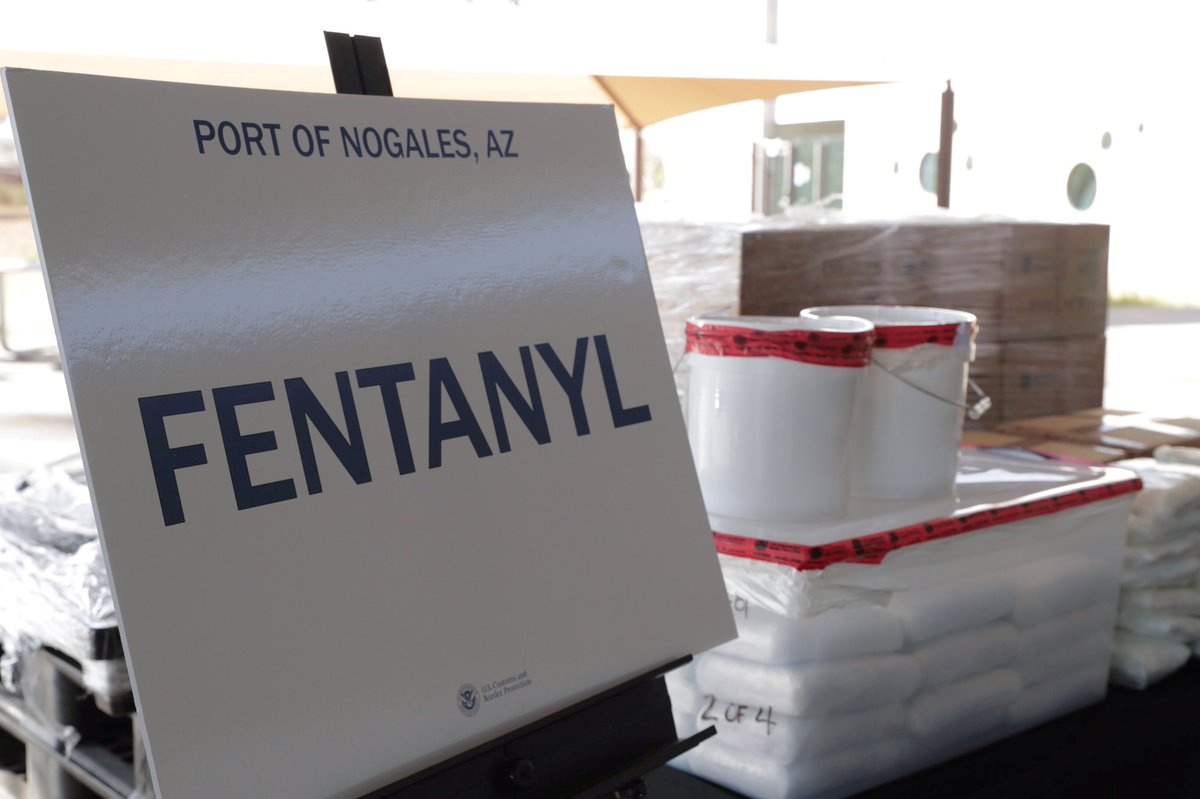By Jonathan Landay
WASHINGTON (Reuters) – China has pledged to stem a flood of the synthetic opioid fentanyl onto America’s streets, where it kills thousands of people a month, but U.S. security experts are skeptical about whether Beijing is willing, or even able, to follow through.
Ten current and former U.S. officials, congressional sources and China and trade experts told Reuters in interviews that China cooperates only when it believes it will get something in return.
In this case, several said, Beijing appears to have offered its help so that it could get the best deal possible from Washington in trade negotiations.
“Will they enforce this, or is this just another gesture to be used to secure something they want?” said Robin Cleveland, vice chair of the congressional U.S.-China Economic and Security Review Commission, which monitors the national security impact of bilateral trade and economic ties.
“I think they would hope to leverage it in some meaningful way in the context of trade talks,” she said.
Those trade talks ran into trouble this week with China backtracking on earlier commitments to change its laws in key areas, including intellectual property rights, trade secrets, forced technology transfers, access to financial services and currency manipulation, Reuters reported on Wednesday, citing U.S. government and private-sector sources.
U.S. President Donald Trump responded to China by vowing to raise tariffs on $200 billion worth of Chinese goods from 10 to 25 percent on Friday.
Unless resolved in a new round of negotiations, the mounting tensions over trade could derail China’s cooperation on fentanyl.
“They are not going to do it, the record says, unless they get a trade deal, or we threaten them in the absence of a trade deal,” said Derek Scissors, an expert on Sino-U.S. economic relations at the American Enterprise Institute think tank.
“They can stop this if they want, but they won’t unless they see a deal.”
An explosion in the use of fentanyl, an opioid painkiller 50 times more potent than heroin, and its analogues has driven the most devastating chapter of America’s long-running opioid crisis, U.S. law enforcement agencies say, and China accounts for most of the fentanyl and fentanyl analogues seized.
The United States recorded more than 28,000 synthetic opioid-related overdose deaths in 2017, according to the U.S. Centers for Disease Control and Prevention, the majority of them fentanyl-related.
Chinese President Xi Jinping promised Trump at a summit in Argentina in December that Beijing would crack down on flows of all fentanyl-related substances.
In April, China pledged that from May 1 it would expand the list of narcotics subject to state control to the more than 1,400 known fentanyl analogues, which have a slightly different chemical makeup but are all addictive and potentially deadly, as well as any new ones developed in the future.
Fentanyl and all of its analogues are controlled substances subject to strict regulation in the United States.
Speaking in Beijing on Friday, Chinese Foreign Ministry spokesman Geng Shuang said China had implemented the change as promised starting from May 1, a move he said had been positively appraised by the United States.
“I want to emphasize here that China keeps to its word,” he told a daily news briefing. “At the same time, I would also like to point out that the root cause of the U.S. fentanyl problem is not in China.”
Asked whether there was a link between China’s promised increased controls on fentanyl and trade talks with the United States, Geng said: “I don’t know what person has such an imagination.”
China’s Ministry of Public Security, National Health Commission and National Medical Products Administration – the departments responsible for the new rules – did not respond to requests for comment on this story. The White House did not respond to requests for comment.
The regulatory change is supposed to shut down the operations of illicit producers and traffickers who advertise and sell fentanyl products on video websites including Google’s YouTube and Vimeo, and on the Dark Web.
They deliver the drugs to the U.S. market mainly in the mail, through express delivery services or trans-shipping them through Mexico and Canada.
Trump hailed the agreement as a major advance in efforts to contain the opioid epidemic. Some U.S. officials who work directly with Chinese law enforcement agencies say they believe Beijing is committed to clamping down.
“We see them as a partner we want to work with to effect that change of availability here in the U.S.,” said Daniel Baldwin, a senior Drug Enforcement Administration official who was its top representative in Beijing from 2011-2014.
The ruling Communist Party’s newspaper, the China Daily, covered the plans to expand the controlled substances list last week under the headline, “China, U.S. join hands to fight fentanyl.”
But even Trump’s attorney general, William Barr, has said it is too soon to claim victory.
“Whether the Chinese … actually deliver on it from an enforcement standpoint remains to be seen,” Barr testified at a House of Representatives budget hearing in April.
PAST FAILURES
Beijing has reneged on pacts with Washington before, U.S. experts say.
In 2017, the bulk of fentanyl seizures by U.S. Customs and Border Protection came from China, despite an agreement announced in September 2016 by the Obama administration on “enhanced measures” to fight trafficking to the United States. China later said it made no such agreement.
China added fentanyl, 24 analogues and two precursors to its narcotics control list beginning in 2015, leading to a sharp reduction in those products. But manufacturers sidestepped the controls by synthesizing new analogues, some of them even more potent and deadly than the original.
They will remain legal until China follows through on its promise to control all forms of fentanyl.
U.S. law enforcement officials worry China will not be able to fully enforce this new crackdown either, even if it sticks to its promise to try.
Its oversight of more than an estimated 400,000 producers and distributors inside vast chemical and pharmaceutical industries is notoriously weak and enforcement agencies are short of inspectors and weakened by corruption, the U.S. experts said.
Fentanyl analogues are relatively easy to make and some producers create front companies to sell fentanyl to traffickers, U.S. experts say.
Further, experts say, local Communist Party officials are under pressure to hit targets for economic growth and so are often reluctant to shut down any growing businesses, including pharmaceutical firms.
Chinese Customs enforcement appears to be even weaker. Officials stopped fewer than a half dozen fentanyl-related shipments in 2016-2017 before they could be shipped out of China, according to Democratic Senator Dianne Feinstein, a co-chair of the U.S. Senate’s Caucus on International Narcotics Control.
U.S. officials have found Chinese inaction frustrating.
“As sophisticated as China is in their intelligence services, I find it odd that they can’t stem the flow of fentanyl from their country,” Joshua Skule, the executive assistant director of the FBI’s Intelligence Branch, told Reuters before Beijing announced it would control all fentanyl-related substances.
China has provided the United States with information that aided in federal indictments of eight Chinese nationals for fentanyl trafficking since 2017. All of the suspects remain at large in China, however, according to a U.S. Congressional Research Service report in December 2018.
“There are many, many laws on Chinese books that don’t get enforced. It will turn out that enforcement is quite spotty,” Scissors said.
China’s government is committed to making a difference on this case, however, says Daniel Baldwin, who served as the U.S. Drug Enforcement Administration’s top representative in Beijing for three years.
“We see them as a partner we want to work with to effect that change of availability here in the U.S.,” he said.
A bipartisan group of senators has introduced a bill to empower Trump to sanction Chinese drug makers and others who knowingly sell synthetic opioids to traffickers. It also would create a commission to monitor flows of the substances from overseas.
“We have to make sure they keep their word,” said Republican Senator Tom Cotton, a co-sponsor of the legislation.
(The story corrects title of FBI official in 37th paragraph.)
(Reporting by Jonathan Landay; Additional reporting by Ben Blanchard in Beijing; Editing by Kieran Murray and Sonya Hepinstall)
















